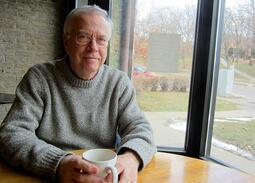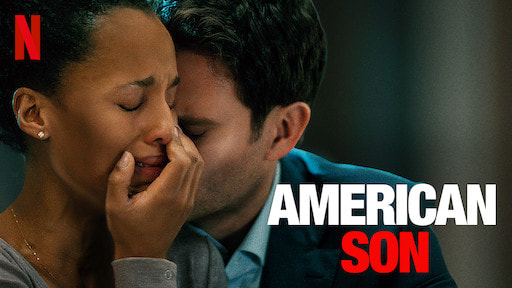|
Friday September 11 • Discussion at 7:00 p.m.
Register: http://bit.ly/rjmoviediscussion Please watch this 2019 docudrama (available on Netflix) and then join the online discussion, facilitated by Rob and Janne Eller-Isaacs, on September 11. Based on the Broadway play, American Son follows Kerry Washington and Steven Pasquale as an estranged couple whose son goes missing. The couple spends the night at a Miami police station in search of answers about their missing son, Jamel. With themes of police brutality and unconscious bias, American Son showcases the treatment of the families of victims and the system’s failure to aid Black families in the aftermath of a murder.
0 Comments
 Bill Doherty on behalf of the Beloved Community Communications Team Unity Church member Bill Doherty is a co-founder of Braver Angels. The name was inspired by the words of Abraham Lincoln, who not only called on Americans to summon the “better angels” of our nature — but also to find the courage to pursue a more perfect union, “with malice toward none, with charity for all, with firmness in the right.” After the 2016 election, I got involved with Braver Angels (formerly Better Angels) to help bridge the red/blue divide. At the same time, I also helped to start two projects with African American men in Minneapolis. The first project was at South High. I was the designer and note taker for a group of young Black men and two Black adult facilitators in the Relationships Project, sponsored by the Office of Black Male Student Achievement. The idea was to improve academic success by working on two principal relationships in the school: with teachers and with young women. The young men interviewed teachers and did focus groups with young women on the topic of how Black young men could take the lead in improving those relationships. Then they developed goals and strategies to which they held one another accountable during their weekly meetings. I saw the power of these young men, who were no strangers to racism in the school and community, taking responsibility to work on something they could control: their part in important relationships. I also experienced their cultural pride in being Black, something that transcended the hardships they faced in a White world. It struck me that these two elements — cultural pride and a sense of agency to make changes on their own, without waiting for White people to change — were missing in many of the racial reconciliation programs I was familiar with. My second involvement was with the Police and Black Men Project, which I co-founded with Guy Bowling, a Black colleague and head of the FATHER Project for low-income fathers. We pulled together a group of five police officers (three White and two Black) and six Black men from the community. We hoped to build relationships of trust and see what we could contribute to better partnerships for community safety. We’ve done community conversations and become involved in police training. We have developed a new narrative to go beyond finger pointing across the conservative/progressive divide on police and race, based on the common goal of safe communities. For me, the Police and Black Men Project has been another experience in the power of taking time to build relationships. We began with storytelling — early experiences with police, with Black men, and with White men. We talked about our fathers. We then moved into more conflictual conversations, with everyone committed to returning to the table over and over, no matter what, because the stakes were so high. This bond of trust, even brotherhood, was necessary for the extremely painful conversation after George Floyd’s killing, first as the community members vented their anger, fear, and despair. The officers listened and condemned what their fellow officer had done. Two weeks later the community members were there to support the officers, who were experiencing ridicule and abuse, particularly from White progressives in the community, even extending to harassment of their families. Out of these experiences have come two new Braver Angels programs on race. First is a 1:1 Black/White Conversation process (two one-hour conversations online or in person) in which two individuals meet to share and understand each other on the topic of race. No one is there to teach the other; instead, they both listen and learn from each other. I did the initial pilot with a Black colleague. I found it the most impactful experience of any conversation about race in my life. My conversation partner expressed a similar level of enthusiasm and impact. Of note, I designed the process so that anyone could fully participate without fear of being called out for expressing the “wrong” opinions or using “wrong” terminology. Braver Angels is nearly ready to launch these 1:1 conversations nationally. The other new program is still under development: a skills workshop (online for now) on depolarizing conversations about race among White people. The premise is that the conversation about race among White people is nearly as broken as the conversation between the races, often degenerating into White progressives teaching or reprimanding conservatives, and conservatives arguing that they are not racist. The result is national paralysis on a path forward. This workshop will teach skills for respectful dialogue in which neither person assumes the higher moral ground or a defensive posture. Braver Angels offers a way for people of different races (Black/White), different political worldviews (red/blue), and different geographical areas (urban/rural) to connect personally and as citizens concerned for their country. Each conversation follows a structured process. For more information, or to get involved, visit our website: braverangels.org. About the Series
Building on the Next Right Action initiative, expert facilitators and trainers gathered by Team Dynamics will lead seven Tuesday evening workshops to explore critical concepts to equip us as champions for racial justice in our own lives, in our communities, and in our spiritual growth and development. Series Learning Goals in Service to Unity’s Multicultural and Racial Healing Ends
Sessions Overview This is a seven-part series. It is our intention that participants attend session one and/or two as prerequisite in order to participate in sessions three through seven. Additionally, we ask that you attend as many as your schedule allows. This is a sequential series and a cohort experience, with each session building on the previous session's concepts and learning. Sign-up is required for each session. An RSVP will be sent to confirm attendance. All sessions are on Zoom, Tuesday evenings, 6:30 – 8:30 p.m., September 15 – October 27, 2020. Each session will be hosted by Alfonso T. Wenker from Team Dynamics with various faculty participating throughout the series. REGISTER FOR SESSION 1 • September 15: Identity + Bias Explore how our beliefs are connected to our experiences of culture + identity and how those beliefs influence our actions. Faculty: Mark Pineda, Sara Wernick Schonwald REGISTER FOR SESSION 2 • September 22: Intercultural Conflict Styles + Strategies Explore conflict through the lens of culture. Understand your preferred conflict style and increase capacity to manage conflict across culture. Faculty: Sara Wernick Schonwald, Liz Loeb, Levi Weinhagen REGISTER FOR SESSION 3 • September 29: Understanding + Utilizing Power Power is an underlying force in relationships and organizations; however, we tend to treat power as a “have or have not.” This session explores power as ever present in all bodies. We will dive into the connections between position, identity and power and explore ways to responsibly exercise power toward equity goals. Faculty: Tyrai Bronson-Pruitt, Pearl Dobbins, Anil Hurkadli REGISTER FOR SESSION 4 • October 6: Constructions of Race + Racism Race impacts every relationship, system and interaction in our daily lives. While concepts of race are a social construct, the impacts (racism and white supremacy) are real in their consequences. This session allows participants to get grounded in their experience of race while noticing patterns and preference for whiteness. Faculty: Tyrai Bronson-Pruitt, Levi Weinhagen REGISTER FOR SESSION 5 • October 13: Social Change + Social Movements What are social movements? What makes movements move? How do we utilize this movement moment to create the transformational change we seek? Together we’ll unpack what are the elements of a movement to understand how each of us is situated in a movement. Faculty: Beth Zemsky REGISTER FOR SESSION 6 • October 20: Organizing + Action “But what can I do about it?” Building from the first five sessions, we’ll talk about how community organizing works in pursuit of justice and how to choose your actions wisely. Faculty: Liz Loeb, Trina Olson REGISTER FOR SESSION 7 • October 27: Using these Tools in Your Practice This will be an open, guided time to ask questions and test out ideas for application of the topics covered in sessions one through six. Faculty: Tyrai Bronson-Pruitt, Levi Weinhagen |
Topics
All
Beloved Community ResourcesUnity Justice Database
Team Dynamics House of Intersectionality Anti-Racism Resources in the Unity Libraries Collection Creative Writers of Color in Unity Libraries The History of Race Relations and Unity Church, 1850-2005 Archives
July 2024
Beloved Community Staff TeamThe Beloved Community Staff Team (BCST) strengthens and coordinates Unity’s antiracism and multicultural work, and provides opportunities for congregants and the church to grow into greater intercultural competency. We help the congregation ground itself in the understanding of antiracism and multiculturalism as a core part of faith formation. We support Unity’s efforts to expand our collective capacity to imagine and build the Beloved Community. Here, we share the stories of this journey — the struggles, the questions, and the collaborations — both at Unity and in the wider world.
The current members of the Beloved Community Staff Team include Rev. Kathleen Rolenz, Rev. KP Hong, Rev. Lara Cowtan, Drew Danielson, Laura Park, Lia Rivamonte and Angela Wilcox. |
